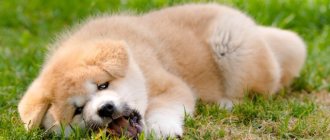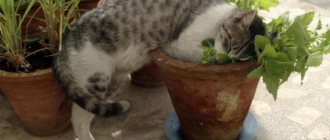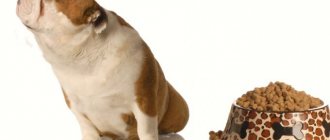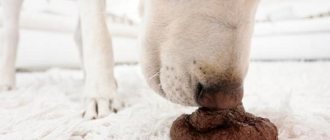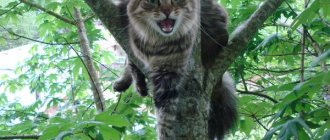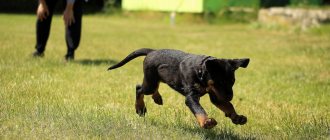Dogs very often do quite strange things on the street during walks: they chew pine cones, eat soil and small stones, bite tree branches, eat grass and leaves. What is the reason for this and is it necessary to combat such addictions in puppies? Let's try to find the answer to the question why a puppy eats dirt and stones while walking.
Perverted appetite of dogs
Do you buy the most expensive food for your pet (find out), try to pamper him with dog treats, but he still eats stones, soil and even the excrement of other animals while walking? Experts call this phenomenon perverted appetite.
. And such behavior, when a dog eats completely inedible things and objects, is not normal. And, although there are experts who say that since a dog eats it, it means it needs it, we would not recommend that you indulge such unnatural desires. All these items that are not intended for consumption - stones, earth, excrement, ropes, pieces of wood, pieces of carpet - all this is not able to be digested by the animal’s body, accordingly, such a “menu” can cause serious diseases and disruptions in the processes digestion and even lead to the death of the animal.
Who is susceptible to pathology
More often this happens with puppies, not only German Shepherds, aged 2 to 3 months. Males and females are susceptible. Raising a puppy is a difficult process. Whims and illnesses are quite normal, the main thing is to pay attention to the violations in time.
By the way, if the dog is no longer a puppy, a perverted appetite can be a symptom of rabies.
The described violation is less relevant to people who regularly feed their dogs animal food. For example, minced meat purchased from a farm. In this case, the meat is ground directly with the bones of the killed animal, and the dog receives double benefit.
Try to feed your animal food designed to improve bone structure, and provide the diet with vitamins.
The danger of perverted appetite in dogs
So, the next time your dog is about to “have breakfast” with stones or sand, try to prevent him. The fact is that firstly, chewing such objects, in particular inorganic substances, can damage its teeth and oral tissues, cause vomiting and diarrhea, lead to intestinal obstruction (all these stones are not digested in the dog’s stomach) and lead to to rupture of internal organs. As you can see, the consequences of such a perverted appetite in dogs are quite sad...
Chronic health problems and eating sandy soil
Looking for vitamins and minerals can also be a sign that your dog has a condition such as inflammatory bowel disease or hypothyroidism.
Inflammation in the intestines can lead to intestinal bleeding or ulcers, which can lead to anemia. Inflammatory bowel disease reduces the absorption of B vitamins. Therefore, dogs with IBD may eat dirt because they are trying to get more minerals to help cope with the anemia. Thyroid hormones help stimulate the bone marrow to produce red blood cells. When thyroid hormone production decreases in hypothyroidism, bone marrow stimulation and anemia decrease.
Other things that can lead to anemia include bleeding tumors, parasites, ulcers and chronic kidney disease. Some tumors will also bleed (particularly hemangiosarcomas), leading to anemia. Internal parasites in dogs, such as hookworms, also cause anemia. They actually attach to the intestinal lining and suck blood. Other intestinal parasites cause decreased nutrient absorption. External parasites, such as fleas and ticks, suck blood, causing anemia.
Gastrointestinal ulcers cause blood loss, which causes anemia. Chronic kidney disease causes anemia because the kidneys produce erythropoietin, which is a hormone that stimulates the bone marrow to produce red blood cells. Autoimmune diseases, in which the immune system attacks red blood cells or platelets, cause anemia.
Causes of perverted appetite in dogs
In fact, there are a lot of reasons that could explain such perverted tastes of your pet. These could be health problems - your dog really lacks some vitamins, but this does not mean that he can find them in the yard cobblestones (read about), this may be due to age-related changes in the animal’s behavior and his old age - dogs, like people, age and lose clarity of mind (o), and perhaps this pet’s behavior is due to its desire to attract your attention, albeit in such a sophisticated way, to the detriment of its health.
Diseases and pathological conditions leading to eating stones
In addition to completely understandable and harmless reasons, there are a number of situations where a dog’s consumption of pebbles is associated with some kind of pathology. In this case, it is recommended to urgently undergo examination by a veterinarian.
Avitaminosis
A lack of a particular vitamin or microelement is accompanied by a significant change in the pet’s behavior. Replenishing the deficiency of this substance in the body will help solve the problem. To find out what exactly your pet is missing, you should contact your veterinarian, making sure to tell him about the symptoms that have arisen.
If a dog is addicted to salty foods, licks and eats stones that are located near bodies of water, then most likely he does not have enough sodium. And when a pet has a passion for plaster, brick, earth, pebbles, eating them during walks, or stirring up flower pots at home, then, as a rule, we are talking about calcium deficiency.
The owner is not always able to solve the problem through proper nutrition. Most often, you will need to supplement your pet’s diet with vitamin and mineral complexes.
Dysbacteriosis
Disturbed intestinal microflora can also add “strangeness” to the dog, which manifests itself in the form of a perverted appetite. The dog may begin to eat plaster, children's crayons, soil, and happily gnaw on wooden furniture and interior items.
By correcting the functioning of the digestive system with the help of drugs, such behavioral oddities usually go away.
Worm infestation
Infection of an animal's body with parasitic worms can make it want to eat pebbles. The owner should be wary if his pet suddenly begins to show interest in flower pots. Perhaps, by turning it over, the dog was trying to get to the drainage rocky layer, which helps to reduce discomfort during helminthiasis for a while.
With severe helminthiasis, the dog exhibits the following signs:
- deterioration in appearance - dull, sparse hair, dermatoses, dandruff, thinness, bloated belly;
- The dog's eating behavior is disturbed, it can eat inedible objects, it suffers from constipation or diarrhea, and larvae are often found in the feces.
It is not difficult to cure your pet - you need to give him an anthelmintic drug. In addition, all animals living in the house should be dewormed. It would also be a good idea for the owner and other family members to take such a medicine, since many parasites are transmitted from animals to people.
Diabetes
Many dog breeds have a genetic predisposition to this disease of the endocrine system: beagles, Dobermans, Labrador retrievers, poodles, Pomeranians, Scotch terriers. Diabetes mellitus is more often detected in older dogs, as well as in those suffering from obesity and other pancreatic diseases.
The owner should be concerned if the dog drinks a lot of water for no apparent reason, defecates frequently, eats more than usual, but his body weight decreases, and a putrid odor appears from his mouth. Without treatment, the dog will die, so you should seek help from a veterinarian as soon as possible.
What is missing
Seeing a dog eating earth with appetite, the first thing that comes to mind is that the body lacks some elements.
According to scientists, most often animals lack macro- and microelements, in particular calcium and carbon.
An unbalanced diet usually leads to the fact that the four-legged pet begins to compensate for the mineral deficiency on its own: gnawing on walls, eating soil from flower pots and on the street.
If eating soil is a consequence of vitamin deficiency, then consultation with a veterinarian is required. He will help you create a complete diet and recommend effective mineral and vitamin supplements.
When your pet is on a natural diet, the following should be included in the daily menu: apples, meat and bone meal, veal kidneys, beef tripe. It is advisable to place crushed chalk and wood ash next to the food bowl. If the dog likes them, then he is definitely experiencing a deficiency of microelements.
The immunodeficiency that develops against this background is dangerous because the animal loses protection against various viruses and bacteria. This is complicated by a slowdown in metabolism, as a result of which the dog’s body is unable to absorb valuable substances supplied with food.
Anemia may be a concomitant pathology. And with a lack of iron, an unbearable desire to get it appears. Since this element is present in the soil, this is the reason why a dog can eat it so readily.
Causes
Possible reasons that could explain the dog's desire to eat earth and sand:
- The body's need for some vital elements: minerals, vitamins. Then there is an instinctive desire to fill the gap.
- Infection with helminths. As a result of discomfort in the intestines, the animal seeks to get rid of it in any way.
- Lack of attention from the owner. In this way, the pet tries to attract attention to itself.
- Depression. Often loneliness or a stressful state leads to psychological disorders and the manifestation of nonspecific habits. One of these is pica - the habit of eating something that is not food, just to fill the stomach.
- Uncontrolled behavior. During play, a puppy or an adult dog may lose control of himself so much that he thoughtlessly swallows a handful of earth or stones.
- Basic curiosity. Sometimes a puppy just wants to taste something unusual and new that is still unfamiliar to him. This is how he experiences real life.
Sometimes furry pets are attracted to the soil in flower pots. The reasons for this are similar, but the pleasant aroma from the inclusions that are mixed in can also serve as bait.
How to stop a dog from eating inedible objects
In turn, on your part, you can also take the initiative and, following our tips and recommendations, try to wean your pet from eating inedible items.
Your behavior in this situation
So, in particular, you should learn that shouting and punishment in such a situation are useless
. If your dog is unfamiliar with commands, and you shout “fu” or “no” to him, he does not understand what you require from him (find out how to teach your dog these commands). Moreover, if the purpose of such behavior was to attract your attention, then now the dog is rejoicing and thinking about what it should eat that is so inedible next time so that you will pay attention to it. So, pretend you're ignoring the problem, but instead... offer your dog something else to chew on, like a harmless dog chew toy. Get yourself a couple of these and alternate them, periodically offering your pet something new. Perhaps in this way you will be able to control his desire to simply chew something, and if such a need arises, he will run to you rather than eat stones.
Many dog breeders are faced with the problem of their puppy eating dirt and stones. There is no particular problem here, because dogs are like little children who put everything in their mouths. But this behavior can cause concern for animal owners, because the soil is not only an inedible product, but can also contain various infections. Eating soil at a young age is simple curiosity, but if this is a constant thing, you should find out the reasons for this behavior.
Simple explanations for “complex” behavior?
Any cub explores the outside world in all available ways. If the family has not yet had animals, too much attention is paid to caring for the puppy. In fact, it’s normal for a puppy to play around a little, chew a slipper or tear up a newspaper... he won’t choke on thread or get poisoned by printing ink.
If you notice that your puppy is eating stones on the street, don’t panic! Perhaps the baby simply did not know that the stone was inedible and tried to gain a new experience. Perhaps he will even risk repeating his attempt, that is, swallowing a pebble on the next walk, and again and again... if this behavior is explained by studying the world, there is no reason to worry. Firstly, small pebbles will come out of the puppy’s digestive system naturally, and secondly, you will have a reason to teach your charge the “Fu” command.
The puppy may chew and even swallow stones simply because they have a subtle taste. For example, while walking near a pond, a dog may find a stone with a salty or sweetish touch - this is a new taste and a new experience. In this case, you need to make sure that the taster does not break his teeth; otherwise, believe me, the baby will figure it out on his own.
Note! If eating stones can be called an isolated incident, do not worry, puppies, young and adult dogs are very curious and from time to time they can try out the world around them.
Simple reasons are not always safe! Statistically, most incidents related to eating inedible things are, to one degree or another, related to vitamin deficiency. When a dog’s body lacks vitamins or microelements, it deliberately chews the ground, licks whitewash, chews cement, etc.
In this case, there are reasons for concern, since constantly eating hard objects (stones) can lead to intestinal blockage, and vitamin deficiency itself is scary not because of its presence, but because of its consequences. A puppy eating whitewash and cement strives to replenish the resources of its growing body, but if these signals are ignored, the dog’s teeth are delayed, ears fall off, paws become loose, and this is just the beginning. Without receiving an enhanced and balanced diet, a young dog cannot fully grow and develop, neither physically nor mentally.
Absolutely all animals (like people) are prone to being affected by worms, and the point is not in the poor health of the former, but in the versatility of the latter. Regardless of age, the dog should receive preventive medications for worms strictly on schedule or more often (if we are talking about gentle medications), but at least once every 4 months. Those helminths that are the easiest to become infected with cause the most serious damage to the metabolic processes and health of the animal as a whole.
The smaller and more harmless the worms, the faster they multiply and literally clog the animal's intestines. The food that a dog eats is not digested, which means the body does not receive the intended benefits. Against the background of helminthic infestation, severe vitamin deficiency can develop. Puppies experience severe growth retardation, problems gaining weight, and reduced activity. Against the background of apathy, the dog socializes worse, which leads to subsequent psychological problems.
You should be wary if your pet has declared war on flower pots. Eating the plants themselves can also be dangerous, but this behavior is more obvious. An overturned pot and soil scattered everywhere may indicate that the dog reached the drainage (small pebbles), which partially relieve the discomfort of severe helminthic infestation.
Important! Almost all plant soils sold in stores are already fertilized (fed). The bacteria that help flowers grow give the soil a slightly sweet smell and taste. The sweet smell may attract a dog that does not suffer from vitamin deficiency or other health problems.
In the three above cases, there is only one course of action - to balance the diet and drive away parasites. If you have become the proud owner of your first puppy, consult a doctor who will tell you what to do and, most importantly, teach you how not to cause harm.
Puppy and adult dogs can swallow small stones accidentally, for example, while eating grass outside. In the spring, when young vegetation is just emerging from the ground, you can observe how greedily dogs eat grass. During a meal, the four-legged animal can tear out tufts of grass and swallow them whole, along with earth and pebbles. There is nothing good about this, but there is no need to panic. To prevent your ward from acting like a barbarian and plucking out the barely sprouted lawn, his food should contain vegetables and herbs. For young dogs and puppies, it is recommended to plant lawn grass (in winter).
Important! Dogs eat grass not for vitamins, as is commonly believed, but to cleanse the digestive system. A healthy four-legged animal eats a large amount of grass and then tears it up so that the bundle of vegetation acts like a brush.
A similar situation, when a dog does not swallow stones on purpose, concerns chewing sticks. The fact is that a stick is both a toy and a hygiene item. Usually, the dog carries the toy with him for some time, drops it on the ground, and then lays down and begins to destroy his find. At the moment of gnawing, the stick is completely covered with saliva, dust, earth and small pebbles (on the coast, sand). However, the “seasonings” do not bother the four-legged dog; he disintegrates his toy into splinters. Typically, a dog has two goals: to scratch his gums and clean off fresh plaque from his teeth. Will preventative teeth cleaning help? It's unlikely that chewing sticks is an instinct, so make sure that your pet doesn't injure his gums, but you should put up with the rest.
Advice: if your older dog grabs a dirty stick, immediately throws it and coughs, do not intervene; most likely, the pet is simply cleaning his mouth from sand or small stones.
What measures to take
If a dog digs in the ground on a walk, eating it, and does the same thing with a flower pot at home, do not panic. It is important to find out the reason that provokes such atypical behavior. You should not yell at a puppy or an adult dog, beat or punish, it is better to take the following measures:
- Include more foods that improve metabolic processes, as well as vegetables and fruits in your daily diet;
- Carry out unscheduled deworming. Usually the procedure is carried out once a season;
- Give your dog a multivitamin prescribed by your veterinarian;
- At home, plant grass on the windowsill, which your pet will switch to and forget about flower pots.
When diet changes and other measures do not help, most likely the reason for eating earth and sand lies in the pet’s disturbed psyche. In this case, the owner should contact a veterinarian and tell them about the dog’s atypical behavior. The doctor will conduct the necessary examinations and, based on the results, prescribe a course of medication for the dog.
Read:
Why do cats rub against human legs?
The owner of a four-legged pet must help the animal restore its disturbed emotional background. It is advisable to walk and play with the dog more often, and try to restrain it when trying to pamper. During the walk, the dog must be on a leash, so that the next time he wants to dig up and eat the earth, he can be pulled back.
Interesting!
Owners of restless and mentally unbalanced dogs should consult with a dog handler, who will tell you how to behave with the animal and wean it from the bad habit.
Weaning methods
It is possible to wean a dog from eating earth, clay and sand, the main thing is to behave as follows:
- When you see that your pet is digging the ground, it is recommended to scare it away by making a sharp clap or whistling loudly. It is advisable to remain unnoticed so that the dog does not recognize the “offender” by sight;
- When going for a walk, the owner should take the puppy's toys with him, for example, a ball or rubber ducks, which will distract the animal from the ground. This option is especially relevant when the puppy is teething;
- When walking in the yard, the dog should be keen on playing or training with its owner;
- Starting from a young age, the puppy needs to be taught commands, the main one being the word “no” - “fu”. After successfully completing the command, the puppy should be rewarded with a treat.
Dog owners should use various methods to wean a puppy or adult dog from a bad habit. It is important to realize that eating earth, sand and sharp stones is dangerous to the health and life of your four-legged friend.
Why does a dog eat dirt?
There is little benefit in eating soil, because the soil may contain helminths, and by eating soil your pet can pick up worms
. In addition, the soil may contain harmful substances - chemical fertilizers, reagents that can cause serious illness.
quadrupeds.
Before you use harsh methods in weaning yourself from eating soil, understand the problem: why does the puppy eat soil
?
There may be various reasons for this:
Simple curiosity, studying the world around us - Expanding the taste range - Infection with worms - Lack of vitamins - Psychological problems
Let's look at each reason separately.
The dog eats earth and stones - what to do?
As we said above, a puppy is a small child who is trying to experience this world
in a natural way - with the help of all his senses, including taste buds. He cannot know that the earth is inedible and it is not good to eat it. It is likely that your puppy will stop eating dirt once he realizes that eating tasty food at home is better than swallowing dirt. In the first two cases, it is useless to punish and stop his actions; wait and let the baby fully explore this world.
If a dog chews earth and stones with appetite already as an adult, the reasons may not be curiosity at all, but the fact that, for example, his body is affected by worms
. The dog uses the earth as a medicine to reduce unpleasant itching in the intestines. Yes, they do feel better, but not for long. Therefore, it is better to give him special medicine for worms.
If you are sure that there are definitely no worms, the reason may be that the four-legged animal lacks vitamins and macroelements in the body
. For the same reason, he can lick walls and stones. Immunodeficiency is a serious problem that needs to be addressed. A dog can be susceptible to viruses, bacteria, and dangerous diseases if measures are not taken in time. Give him more vitamins, meat, calcium, vegetables and
. Apples, raw carrots, sweet peppers can replenish iron deficiency in the body; plant grass for dogs so that he can easily replenish the lack of vitamins in the body.
Have you ruled out physiological causes, but your dog continues to eat sand? The reason goes deeper than the needs of the body - your pet has psychological disorders
. Think, perhaps something influenced him: a difficult childhood, lack of attention, boredom, a new pet in the house, fear, prolonged stress, moving, etc. For example, dogs that are experienced in living in prolonged periods of hunger can eat everything without feeling hungry. Pica is eating everything in a row with only one goal - to fill your stomach. Surround your dog with care and attention, spend more time with him, let him know that he is loved in this home
.
Why do dogs eat dirt and soil with pebbles and other natural debris?
The primary reason why animals eat the earth is that it contains huge amounts of salts and minerals that every animal needs as it grows. Therefore, the main reason is a lack of essential microelements. Even if the dog eats expensive, high-quality food or is on a special diet, there may not be enough microelements on the menu. Even when vitamin complexes are added to the diet, the animal understands that it is missing something.
The second reason may be depression in the pet. Don’t be surprised, dogs also tend to get depressed and thus show the owner that they feel bad and want more attention. Depression may be associated with moving, a change in weather, or the puppy may simply miss you when you are at work. Under no circumstances punish your child for this, but rather give him a little more time and attention. This way the puppy will be able to better adapt to new conditions and get used to the new rhythm of life.
The only danger for a pet in eating soil is that it can in the process introduce eggs and larvae of various helminths and other parasites into the body. If the puppy was treated for parasites in a timely manner with high-quality modern means, there is no need to be afraid. If for some reason you missed taking these medications, then it is better not to delay it. Otherwise, eating earth and pebbles cannot be dangerous for your pet. Even if the puppy eats a little earth or a couple of small stones or twigs, it will not cause any serious consequences.
Mental disorders
A few decades ago, veterinary medicine did not even consider mental illness in animals. Four-legged animals cannot complain, which means there is no reason for statistics. However, the experience of thousands of owners suggests the opposite; dogs, like people, suffer from emotional distress and mental disorders. Recent studies conducted on small control groups of animals have shown that four-legged animals are more sensitive to emotional pain, although this may not be obvious from the outside.
The desire to eat inedible things is a real mental illness, no less severe than bulimia nervosa in humans. This kind of disorder is divided into two types:
- Pica – the animal is hungry almost always and is ready to eat absolutely everything, including inedible things. It is believed that pica can manifest itself in different degrees, that is, some “patients” still have certain boundaries. It is worth understanding that with a mental disorder, even against the background of increased appetite, the dog hardly gains weight, but gets sick more often.
- Coprophagia - a dog eats its own or other people's feces, can manifest itself as an independent disease or in combination with pica. If coprophagia is suspected, you should consult a doctor to rule out vitamin deficiency and dysbacteriosis, the symptoms of which it is.
A dog with an unhealthy psyche is not uncommon, especially lately. Heredity plays an important role, that is, when buying a puppy from an elite nursery, you do not have any guarantees. However, all records are broken by dogs rescued from the streets, shelters and from careless owners. The psyche is a separate system of the body, which has its own strength limit. When a dog is periodically stressed and has a chance to catch his breath, he is much more likely to remain healthy. Four-legged animals that end up in shelters, traps, or the hands of cruel owners are constantly under stress and their psyche is forced to adjust... and each time this happens differently.
Physiological reasons
If you suspect a dog has a mental disorder, you need to contact a veterinarian, who should confirm your concerns. However, such diagnoses are made only when one is confident in overall physical health. Based on evidence on veterinary forums, there are three popular causes for suspected mental illness (two of which we have already discussed):
- Worm infestation - leads to a feeling of pressure in the abdomen, obsessive itching in the anus and intestines.
- Vitamin deficiency is most often a lack of microelements, leading to the consumption of specific inedible “substances”: earth, whitewash, stones that contain cement, etc. With general vitamin deficiency, the dog is simply always hungry, which can be confused with pica. The difference is that with vitamin deficiency, the dog eats a lot and gains fat mass (not muscle), while with a mental disorder, the dog, as a rule, either loses weight or remains in the same shape.
- Dysbacteriosis is a disease accompanied by a number of unpleasant symptoms, from flatulence to complete inability to digest food. Against the background of dysbacteriosis, vitamin deficiency develops and the dog feels constantly hungry, despite adequate feeding. There are many reasons, from purchasing stale or fake food to treatment with aggressive medications and heredity.
Another physiological reason that is difficult to identify without bitter experience is immunodeficiency. In cats, this diagnosis is more common and is viral (that is, quickly transmitted to other, healthy individuals), but absolutely safe for humans. Immunodeficiency in dogs is virtually unknown. It is known that the disease is not dangerous for people, but how quickly it progresses and how much it harms the dog is always a mystery.
Against the background of immunodeficiency, the dog becomes more defenseless against any viral and bacterial agents. The first bell that indicates problems is metabolic disorders that cannot be corrected by traditional methods. Even with adequate feeding, the sick animal develops anemia due to iron deficiency. A dog's natural desire is to eat earth, sand, cameos and anything that has a salty-metallic taste.
How to stop a dog from eating soil?
Have you figured out the reasons, eliminated all the factors, got rid of helminths, provided your dog with comfort and vitamins, but she continues to chew the earth with gusto? Most likely, it's a matter of habit. From an early age, teach your puppy the commands: “Ugh!”, “No!”. As soon as the dog begins to absorb the ground, say commands and pull him off the ground using a leash. Do not use physical force under any circumstances, this can only make the situation worse.
I recently met a young shepherd dog who preferred stones to sticks and other objects on walks. The owner threw a stone at her instead of a stick, she rushed after the toy, buried it and guarded it. I asked why the dog eats stones, to which the owner stated that she only supported her pet’s game.
This situation is not unique. However, playing with or eating pebbles is extremely dangerous. It is necessary for crocodiles and some species of birds to help digest the contents in the stomach. Stones grind food for crocodiles to fully digest and help them dive deeper. Wild wolves have been observed to sometimes eat these inedible items. For dogs, playing with pebbles can cause irreparable harm. And sometimes cause death.
How can this happen?
You may not see your dog eating a pile of sand, but you may notice that:
- Your dog grabs the wet sand ball over and over again.
- He digs a big hole to lie in while sand flies in his face.
- Licks sand from its paws and body.
- Swallows salty, sandy water.
Generally, ingesting a small amount of sand will not harm your dog. But add all of these activities together, and before you know it, you and your dog could be in big trouble.
Answer
Owners of dogs with extremely sharp teeth often encounter this difficulty. In search of an object to sharpen, a dog (puppies often do this) attacks:
- Crushed stone;
- Cement;
- Coal;
- Ash;
- Concrete;
- Sand.
Home furniture is included in the list of damaged items. However, sand, stones and concrete will certainly harm a dog’s stomach, injuring the walls of its organs. Pebbles help birds grind solid food in the stomach; stones are contraindicated for dogs.
Often the dog not only sharpens his teeth, but takes stones into his mouth, sometimes swallowing. For the owner, the phenomenon becomes an alarm bell; from swallowing such things, the dog’s stomach is not in the best condition. If the puppy lacks mineral elements, the dog begins to chew on solids.
If you do not notice the situation in time, the dog’s development will move in the wrong direction.
Why are stones dangerous for dogs?
- Damage to teeth and soft tissues of the pharynx. This is not a rabbit or guinea pig whose teeth are constantly growing and need to be ground down. The dog’s teeth wear down and then there will be nothing left to chew normal food with.
- Intestinal obstruction. In veterinary medicine, there are many cases of deaths of tailed animals because a swallowed stone (or many stones) clogs the intestines and only a timely operation will save the animal.
- Diarrhea, constipation, vomiting - these troubles are also caused by solid inedible objects.
- Injury to the esophagus or other organs of the digestive tract. Sharp angles cause bleeding, which will be difficult to find.
- The pet may choke and suffocate.
This information is enough to try to protect your pet from such games or food. What are the reasons for eating stones?
Danger from eating soil
One cannot underestimate the danger that threatens a four-legged pet with such a radical change in food preferences. If left unattended, the habit of eating soil will become commonplace.
How does this threaten the dog’s health?
- Damage to the esophagus by parasites. Even a small portion of land will be enough.
- Serious poisoning of a dog, leading to digestive failure. Against this background, diarrhea or constipation develops. This is due to the accumulation of various poisons and toxins in the urban soil, which penetrate into it with precipitation and along with exhaust gases.
- Intestinal blockage - obstruction. Also, eaten pebbles can damage the mucous membrane of the intestines or esophagus, and in the mouth, damage the integrity of the teeth. The worst outcome is death from suffocation if rocky particles become lodged in the throat.
To avoid harmful consequences, it is necessary to wean the animal from its atypical addiction as soon as possible.
Likely consequences
Having figured out why dogs eat soil, we need to talk about what this behavior entails. Such a habit can negatively affect the health of the animal. This is because the dirt may contain hazardous particles or harmful chemicals. If you notice that your pet is gnawing on the soil, stop it immediately.
Those who already know why a dog eats soil on the street should understand that such actions will sooner or later provoke Stones, dirt and other small particles gradually accumulate in its stomach and intestines and, after some time, cause various disorders. In addition, indigestible pieces may become stuck in the digestive tract, in which case you will need to immediately contact a veterinarian.
The habit of gnawing dirt is also harmful to dog teeth. Constant grinding of fangs and incisors leads to damage to the enamel and the formation of cracks. In addition, this process can cause tooth fracture.
What to do if your dog eats stones
Visit your veterinarian, who will run a series of tests to rule out certain diseases. If necessary, he will prescribe medications or vitamins. If the veterinarian does not prescribe any treatment, then solve the behavior problem. The simplest thing is to pay attention to your pet, exercise it physically and mentally.
If there is a scavenger dog living in the house, then the distraction method will help. You can offer your pet a treat to replace the spit out pebble. Continue to reinforce the animal's correct behavior.
Here are tips from Sofia Baskina, an animal behaviorist.
Most often the command “Fu!” is introduced to prevent the dog from picking up food on the street. Here, too, we need to make a retreat. It is much more important that the dog is not afraid of you and comes when you call than that it does not take food on the street. Therefore, never punish a dog that has eaten some kind of rubbish and now runs up to you.
1) take 2 pieces - in your left and right hand. Show a piece from your right hand, say briefly, in a low voice: “Ugh!” and close your palm, preventing it from grabbing the piece. And immediately - “Well done, ugh!” and give a piece from the left. Repeat until the dog, after the command “fu!” will not start to turn away from the piece and you will not need to cover your palm. Now you can put the forbidden piece on the floor and continue training in the same way. Then throw a piece in front of the dog. If the dog couldn’t stand it and ate it, say: “Bad!” and take her out of the room for a minute. Then continue your training. 2) Go outside and briefly repeat step 1. After that, scatter the pieces along the road. Walk along it with your dog. If she doesn’t pay attention to them, praise them and treat them from your hands. If he tries to grab him, “Ugh!” If the dog grabs a piece and you are sure that it will not bite you, try to put your palm in its mouth and press on the root of its tongue, forcing it to burp and saying “Spit!” They almost never regurgitate pieces, but they learn to spit out. The method is quite unpleasant, but sometimes it saves the dog’s life if it grabs a poisoned piece and you manage to shout “Spit!” If you cannot do this, scold her and continue training again. The command "fu!" – negative and you shouldn’t do it for a long time, as you can ruin the contact with the dog. 5-7 minutes a day is more than enough. 3) If a dog picks up something on the street and runs up to you, tell it ew and try to pull this “something” out of its mouth, showing your piece of treat, try to exchange what you found on the street with your piece. Many owners, having taken a bone from a dog, throw it away and the dog again flies into the bushes and picks it up again. It’s better to throw a bone at your feet and walk around it with the dog, repeating the command “Ugh!”
Some breeds are famous for their litter-giving tendencies. Most often these are dogs with a good sense of smell - Labradors, poodles, spaniels, pointers, huskies - or dogs with a homeless past. Such dogs will never walk past an abandoned chicken bone indifferently. The maximum that can be done with them is to teach them not to take a piece on the command “Ugh!” or spit out on command “Spit!” That is, you will have to carefully monitor the dog while walking and notice that it is trying to pick up something. Not a single such case should be left unattended, like today let him take it, I don’t have time, but tomorrow let him not take it, otherwise I’ll be ashamed in front of my neighbors. Always scold your dog, you can throw a leash at him while he is trying to pick up something, and always stop scolding if he comes within 1.5 m of you or spits out a bone. Praise her immediately and move on. Keep your emotions under control. It is better to insincerely praise a dog than to sincerely beat it.
Why are tennis balls dangerous for dogs?
By the way, not only boulders, large and small, are dangerous for teeth, but also ordinary tennis balls, which we often give to our pets to play with. The fiber that covers the tennis ball has an abrasive property and wears down teeth. A stubborn dog can chew it and swallow the remains of the ball, which causes intestinal obstruction.
In this article, you learned about why dogs eat rocks and what you can do about it. Do not ignore this behavior of your pet. If your tailed friend lives in the yard, then remove all the stones so as not to provoke the animal. But instead of pebbles, offer something else to play with or chew on.
Puppies tend to chew everything and in most cases, this is explained by childhood curiosity. Many dogs take great pleasure in chewing sticks or tearing soft toys, sometimes swallowing part of the prey... this is not very good, but it does not cause concern. If a dog eats stones, dirt or sand, any responsible owner has a number of questions: how dangerous is it, why is it happening and how to stop it.
Any cub explores the outside world in all available ways. If the family has not yet had animals, too much attention is paid to caring for the puppy. In fact, it’s normal for a puppy to play around a little, chew a slipper or tear up a newspaper... he won’t choke on thread or get poisoned by printing ink.
If you notice that your puppy is eating stones on the street, don’t panic! Perhaps the baby simply did not know that the stone was inedible and tried to gain a new experience. Perhaps he will even risk repeating his attempt, that is, swallowing a pebble on the next walk, and again and again... if this behavior is explained by studying the world, there is no reason to worry
. Firstly, small pebbles will come out of the puppy’s digestive system naturally, and secondly, you will have a reason to teach your ward the command.
The puppy may chew and even swallow stones simply because they have a subtle taste. For example, while walking near a pond, a dog may find a stone with a salty or sweetish touch - this is a new taste and a new experience. In this case, you need to
make sure that the taster does not break his teeth;
otherwise, believe me, the baby will figure it out on his own.
Note!
If eating stones can be called an isolated incident, do not worry, puppies, young and adult dogs are very curious and from time to time they can try out the world around them.
Simple reasons are not always safe! Statistically, most incidents related to eating inedible things are related to one degree or another. When a dog’s body lacks vitamins or microelements, it deliberately chews the ground, licks whitewash, chews cement, etc.
In this case, there are reasons for concern, since constantly eating hard objects (stones) can lead to vitamin deficiency, and vitamin deficiency itself is scary not because of its presence, but because of its consequences. A puppy eating whitewash and cement seeks to replenish the resources of its growing body, but if these signals are ignored, the dog’s teeth are delayed, ears fall off, and paws become loose.
and this is just the beginning. Without receiving an enhanced and balanced diet, a young dog cannot fully grow and develop, neither physically nor mentally.
How to prevent your dog from feeding sand
After speaking with your veterinarian and identifying the problem, the professional will suggest several steps to follow to prevent your dog from continuing to eat sand. However, you can also follow these other ideas to avoid this behavior:
- Make sure the food you offer your dog is rich in minerals such as calcium and iron. Otherwise, switch to high-quality and nutritious food.
- If you've cut back on food and your dog is overweight, feed him low-calorie food instead of small amounts.
- Deworm your dog to prevent the worms from absorbing nutrients essential to their well-being, known as intestinal parasites.
- Pay more attention to your friend. Entertain him with new toys or longer walks. A tired dog is less likely to eat sand.
- Keep an eye on him when he's in the yard and place pots out of reach if possible.
- Otherwise, move him away from where that potty or sandy area is that he finds so appetizing and/or reward him when he goes off on his own when you call him.
- Never aggressively scold or insult your dog for unacceptable behavior. You will only cause injury!
Just as your dog was interested in eating sand, he may also be interested in tasting feces, grass, rocks or twigs. The causes of these disorders are very similar, so you can take steps to avoid them.
Author of the article: Noelia Manjon Zoology Specialist. Diversity and organization of animals. I am an English philologist and translator by profession and a lover of animals and nature as a way of life. I have always enjoyed learning about and being involved in the care and conservation of the planet and its species. So much so that today my professional career also aims to combine my two passions: communication and social awareness and animal science. With a master's degree in Journalism and Communication of Science and Environment from the Calos III University of Madrid, a specialist course in zoology and many years of experience in caring for all types of pets, especially dogs, the collaboration at woofy dog has been very successful. a great way to spend time doing something I really enjoy.

